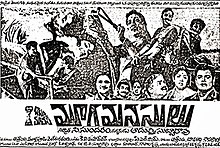Mooga Manasulu
| Mooga Manasulu | |
|---|---|
 Theatrical release poster | |
| Directed by | Adurthi Subba Rao |
| Written by | Acharya Aatreya Mullapudi Venkata Ramana (story / dialogues) |
| Screenplay by | Adurthi Subba Rao |
| Produced by | C. Sundaram |
| Starring | Akkineni Nageswara Rao Savitri Jamuna |
| Cinematography | P. L. Roy |
| Edited by | T. Krishna |
| Music by | K. V. Mahadevan |
Production company | Babu Movies |
| Distributed by | Sri Films |
Release date |
|
Running time | 160 mins |
| Country | India |
| Language | Telugu |
Mooga Manasulu (transl. Mute Hearts) is a 1964 Indian Telugu-language romantic drama film directed by Adurthi Subba Rao who co-wrote the film with Acharya Aatreya and Mullapudi Venkata Ramana. The film stars Akkineni Nageswara Rao, Savitri and Jamuna, with music composed by K. V. Mahadevan.[1] It is based on the concept of reincarnation.[2]
Mooga Manasulu received the Certificate of Merit at the 11th National Film Awards, and the Filmfare Award for Best Film – Telugu at the 12th Filmfare Awards South. It was screened at the Karlovy Vary International Film Festival.[3][1] The film was remade in Hindi as Milan (1967) directed by Subba Rao himself, and in Tamil as Praptham (1971) directed and produced by Savitri.
Plot
[edit]The film is a gorgeous love narrative that faiths on reincarnation, which begins with newlyweds Gopi & Radha walking on their honeymoon. Midway, they have a ferry in the river Godavari when Gopi hallucinates owing to the risk of whirlpool ahead. On landing at the nearby shore, reflections splash of his early life in Gopi's mind. At that point, they meet an old man who says that Gopi & Radha were deceased long ago. Gopi seeks Gowri, the naïve shepherd girl in those days. He rushes, knowing that she is still waiting for him at their graves since she pledged to die in his hands. Therein, Gopi spots an old lady lighting, who leaves her breath in his lap. As of now, Radha is perplexed when Gopi spins rearward.
Indeed, Gopi is a boatman and is credited by all for his amicable nature. Radha is the daughter of Zamindar and civilizing in the town. So, Gopi trespasses her across the river daily; the two share beyond relationship, and she silently loves him. Despite his reciprocation, Gowri devotes her life to Gopi and longs to knit him. Rambabu, the wealthy Radha's colleague, endears her. He expresses it via a letter when Gopi slaps him. Anyhow, Radha's virago stepmother, Ramadevi, refers to her vicious sibling, Rajendra. He applies it to his self-interest by fixing the alliance with a bribe from Rambabu. Radha is appalled and proceeds to Gopi but backs up on his passive response to her wedding. Radha accepts fate, spouses Rambabu, and departs to her in-laws's house. Besides, Rajendra lusts for Gowri and attempts to molest her when Gopi shields. It leads to enmity between them.
Tragically, ailing Rambabu dies, and Radha returns as a widow. Spotting it, Gopi is devastated, and he turns into a frequent to console grief-stricken Radha. The black guards spread rumors, making everyone suspect Gopi & Radha via Gowri. Listening to it, Gopi loathes himself and sets to die rebuking on Gowri. Gowri notifies Radha, who hastens to save him by stating these rumors become true and accompanying Gopi. Though Gopi hesitates initially moves on by no longer caring about society and starts crossing the river. Rajendra steps to slaughter them and instigates the villagers as enraged; they chase them—Gowri sacrifices by molding as mistress to Rajendra for guarding Gopi & Radha. At last, destiny backlashes through a whirlpool that mingles Gopi & Radha. Finally, the movie ends happily with the current reunion of Gopi & Radha, paying homage at Gowri's grave.
Cast
[edit]- Akkineni Nageswara Rao as Gopinath
- Savitri as Radha
- Jamuna as Gowri
- Nagabhushanam as Rajendra
- Gummadi as Zamindar
- Padmanabham as Rambabu
- Allu Ramalingaiah as Appanna
- Suryakantham as Ramadevi
- Lakshmikanthamma as Avva
Music
[edit]| Mooga Manasulu | |
|---|---|
| Film score by | |
| Released | 1964 |
| Genre | Soundtrack |
| Length | 35:09 |
| Producer | K. V. Mahadevan |
Music was composed by K. V. Mahadevan. All songs are evergreen blockbusters. Music released on Audio Company.
| S. No. | Song Title | Lyrics | Singers | length |
|---|---|---|---|---|
| 1 | "Eenaati Ee Bandhamenatido" | Acharya Aatreya | Ghantasala, P. Susheela | 4:31 |
| 2 | "Godari Gattundi" | Dasaradhi | P. Susheela | 4:17 |
| 3 | "Muddabanthi Puvvulo Moogakalla Oosulu" | Acharya Aatreya | Ghantasala | 4:19 |
| 4 | "Gowaramma Nee Mogudevaramma" | Kosaraju | Ghantasala, P. Susheela | 5:16 |
| 5 | "Naa Paata Nee Nota Palakala Chilaka" | Acharya Aatreya | Ghantasala, P. Susheela | 5:20 |
| 6 | "Paadutha Teeyaga Challaga" | Acharya Aatreya | Ghantasala | 4:38 |
| 7 | "Mukku Meeda Kopam" | Acharya Aatreya | Jamuna Rani | 3:19 |
| 8 | "Maanu Maakunu Gaanu" | Acharya Aatreya | P. Susheela | 3:29 |
Awards
[edit]- National Film Award for Best Feature Film in Telugu - Certificate of Merit
- Filmfare Best Film Award (Telugu) (1964)
References
[edit]- ^ a b "Chit Chat with Jamuna". 27 April 2009. Archived from the original on 1 May 2009.
- ^ Randor Guy (30 November 2013). "Master movie maker". The Hindu. Retrieved 13 July 2021.
- ^ "11th National Film Awards". International Film Festival of India. Archived from the original on 25 February 2012. Retrieved 13 September 2011.
